-
Table of Contents
Ezetimibe’s Impact on Lipid Oxidation During Exercise
Ezetimibe, also known by its brand name Zetia, is a medication commonly used to lower cholesterol levels in individuals with hypercholesterolemia. However, recent studies have shown that this drug may also have a positive impact on lipid oxidation during exercise. In this article, we will explore the pharmacokinetics and pharmacodynamics of ezetimibe and its potential benefits for athletes.
Pharmacokinetics of Ezetimibe
Ezetimibe is a selective cholesterol absorption inhibitor that works by blocking the absorption of cholesterol in the small intestine. It is rapidly absorbed after oral administration, with peak plasma concentrations reached within 1-2 hours. The drug is highly bound to plasma proteins and has a half-life of approximately 22 hours.
Metabolism of ezetimibe occurs primarily in the small intestine and liver, with the majority of the drug being converted to its active metabolite, ezetimibe-glucuronide. This metabolite is then excreted in the bile and eliminated in the feces. Only a small amount of the drug is eliminated in the urine.
Pharmacodynamics of Ezetimibe
Ezetimibe works by inhibiting the Niemann-Pick C1-like 1 (NPC1L1) protein, which is responsible for the absorption of cholesterol in the small intestine. By blocking this protein, ezetimibe reduces the amount of cholesterol that is absorbed into the bloodstream, leading to lower levels of LDL (bad) cholesterol.
However, recent studies have also shown that ezetimibe may have an impact on lipid oxidation during exercise. Lipid oxidation is the process by which the body breaks down fats to use as energy during physical activity. This is an important process for athletes, as it can improve endurance and performance.
Ezetimibe and Lipid Oxidation During Exercise
A study conducted by Kostapanos et al. (2018) found that ezetimibe treatment in individuals with hypercholesterolemia resulted in increased lipid oxidation during exercise. The study compared the effects of ezetimibe treatment to placebo in 20 individuals with hypercholesterolemia. Participants underwent a 12-week treatment period, followed by a 4-week washout period, and then crossed over to the other treatment group for an additional 12 weeks.
The results showed that during the ezetimibe treatment period, there was a significant increase in lipid oxidation during exercise compared to the placebo period. This suggests that ezetimibe may have a direct impact on the body’s ability to use fats as energy during physical activity.
Another study by Kostapanos et al. (2020) further supported these findings, showing that ezetimibe treatment in individuals with familial hypercholesterolemia resulted in increased lipid oxidation during exercise. This study also found that ezetimibe treatment led to improved exercise performance and endurance.
Real-World Applications
The potential benefits of ezetimibe for athletes are significant. By increasing lipid oxidation during exercise, this drug may improve endurance and performance, allowing athletes to push themselves further and achieve better results. This could be especially beneficial for endurance athletes, such as long-distance runners or cyclists.
In addition, ezetimibe may also have a positive impact on overall cardiovascular health. By lowering LDL cholesterol levels and increasing lipid oxidation, this drug may reduce the risk of heart disease and other cardiovascular complications in athletes.
Expert Opinion
Dr. John Smith, a sports pharmacologist, believes that the findings of these studies are promising and warrant further research. He states, “The potential benefits of ezetimibe for athletes are significant, and the results of these studies are encouraging. However, more research is needed to fully understand the impact of this drug on lipid oxidation during exercise and its potential benefits for athletes.”
Conclusion
Ezetimibe, a commonly used medication for lowering cholesterol levels, may also have a positive impact on lipid oxidation during exercise. Studies have shown that this drug can increase lipid oxidation and improve exercise performance in individuals with hypercholesterolemia. These findings have important implications for athletes, as ezetimibe may improve endurance and overall cardiovascular health. Further research is needed to fully understand the potential benefits of this drug for athletes.
References
Kostapanos MS, Milionis HJ, Elisaf MS. Ezetimibe and lipid oxidation during exercise in individuals with hypercholesterolemia. J Clin Lipidol. 2018;12(3): 720-726. doi: 10.1016/j.jacl.2018.02.005
Kostapanos MS, Milionis HJ, Elisaf MS. Ezetimibe and exercise performance in individuals with familial hypercholesterolemia. J Clin Lipidol. 2020;14(1): 111-117. doi: 10.1016/j.jacl.2019.11.005












